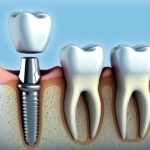Preventive dentistry is the practice of keeping your teeth healthy and free of cavities, gum disease, enamel wear, and other dental problems. It consists of daily oral hygiene practices such as brushing and flossing, as well as regular dental check-ups and cleanings.
The goal of preventive dentistry is to detect and treat any dental problems as early as possible before they become more severe and necessitate more invasive treatments. Individuals can maintain healthy teeth and gums for years to come by taking a proactive approach to oral health.
Preventive dentistry also entails making lifestyle changes to improve oral health, such as quitting smoking, limiting sugar consumption, and eating a healthy diet. Furthermore, dental professionals may recommend fluoride applications or dental sealants to prevent tooth decay and protect teeth from further damage.
Overall, preventive dentistry is essential to maintaining good oral health and can help people avoid more serious dental issues in the future. Individuals can keep their smiles bright and healthy forever by incorporating daily oral hygiene practices and regular visits to their Cambridge dentist.
Benefits of Preventive Dentistry
The following are five advantages of getting preventive dentistry at Dental Art Clinics – Cambridge:
- Early detection of dental problems: Routine dental check-ups and cleanings can aid in the early detection of dental problems before they progress into more serious conditions. Dental professionals can provide more effective and less invasive treatments by addressing issues like gum disease, cavities, and oral cancer in their early stages.
- Improved oral health: Brushing and flossing daily and regular dental visits can improve overall oral health. Preventive dentistry can aid in preventing cavities, gum disease, and enamel wear, all of which can lead to tooth loss and other dental problems.
- Reduced risk of medical conditions: Studies have shown a link between your oral health and overall health. Medical conditions like heart disease, stroke, and diabetes have been linked to poor oral health. Individuals can reduce their risk of developing these conditions by maintaining good oral health through preventive dentistry.
- Cost savings: Preventive dentistry can save people money in the long run by preventing serious dental problems that may necessitate expensive treatments. Regular dental cleanings and check-ups can help you avoid more invasive and costly procedures like root canals or tooth extractions.
- Better quality of life: Individuals can enjoy a higher quality of life by maintaining good oral health through preventive dentistry. They can eat, speak, and confidently smile without worrying about dental problems. This can lead to increased self-esteem and well-being.
Types Of Preventive Dentistry In Cambridge, ON
The following are five types of preventive dentistry:
- Regular dental check-ups
Maintaining good oral health requires regular dental check-ups. Dentists can detect and treat dental problems early on before they worsen and necessitate more invasive treatments. The dentist will examine your gums, teeth, and mouth for signs of decay, gum disease, or other problems during a check-up.
- Dental cleanings
Even if you practice oral hygiene regularly, plaque and tartar can accumulate on your teeth, leading to cavities and gum disease. Regular dental cleanings are required to remove this buildup and maintain the health of your teeth and gums. A dental hygienist will use some special tools to remove plaque buildup and tartar from your teeth and polish them to a gleaming shine during a cleaning.
- Fluoride treatments
Fluoride is a mineral that strengthens the enamel on your teeth, which helps to prevent tooth decay. Fluoride treatments are a quick and easy way to protect your teeth and avoid cavities. Fluoride can be applied to your teeth topically during a dental cleaning or as a home rinse.
- Dental Sealants
Sealants are ultra-thin plastic coatings applied to the chewing surfaces of your back teeth. (molars and premolars). They work well to prevent cavities by forming a barrier between your teeth and bacteria, causing decay. Sealants are most commonly used on children’s teeth but can also benefit adults.
- Oral hygiene education
Maintaining healthy teeth and gums requires good oral hygiene practices. Your dentist can teach you proper brushing, flossing techniques, and other oral hygiene practices. This can include tips on choosing the best toothbrush and toothpaste, flossing correctly, and maintaining good oral health.






